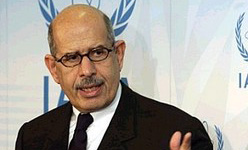 TEHRAN (FNA)- UN atomic watchdog chief Mohamed ElBaradei in an interview published on Sunday welcomed recent overtures by US President Barack Obama to engage Iran in talks on its nuclear program.
TEHRAN (FNA)- UN atomic watchdog chief Mohamed ElBaradei in an interview published on Sunday welcomed recent overtures by US President Barack Obama to engage Iran in talks on its nuclear program.
ElBaradei called in an interview with the Washington Post for “a direct dialogue” between Iran and the United States, to encourage “trust-building” between the two nations.
“You’re not going to have trust unless you have a direct dialogue. President Obama is saying he’s ready to have a direct dialogue without preconditions, based on mutual respect. I say this is absolutely overdue,” ElBaradei told the newspaper.
Experts have said that even before winning November’s presidential election, Obama began to engage in “track two” discussions to approach America’s foes in the Middle East, including Iran.
In an interview last week, Obama said the United States would offer Iran an extended hand of diplomacy if the Islamic Republic’s leaders “unclenched their fist.”
ElBaradei told The Post that diplomatic efforts to compel Iranian cooperation have been ineffective.
“Iran was cooperating even more before,” he said.” They cut the cooperation … when they were taken to the Security Council in 2005.”
He added, “I have said for the past six years that the policy of building trust between the West (and the United States in particular) and Iran has failed completely. We haven’t moved one iota,” he said.
ElBaradei also praised his agency’s efforts to shed light on Iran’s atomic program, which it long has claimed is civilian in nature, but which some countries believe aims to develop nuclear weapons.
“We have done as much as we can do in Iran to make sure that we understand the history and the present status of their program, to try to push them as far as we can within our authority to come clean,” ElBaradei told the daily.
He added, “I am very proud that within the limited authority we have, we have been able to understand the scope of the most sensitive part of the Iranian program, which is the enrichment program, which is now under complete agency inspection.”
Iran is under three rounds of UN Security Council sanctions for turning down West’s calls to give up its right of uranium enrichment, saying the demand is politically tainted and illogical.
Iran has so far ruled out halting or limiting its nuclear work in exchange for trade and other incentives, saying that renouncing its rights under the NPT would encourage world powers to put further pressure on the country and would not lead to a change in the West’s hardline stance on Tehran.
Iran has also insisted that it would continue enriching uranium because it needs to provide fuel to a 300-megawatt light-water reactor it is building in the southwestern town of Darkhoveyn as well as its first nuclear power plant in the southern port city of Bushehr.
Tehran has repeatedly said that it considers its nuclear case closed as it has come clean of IAEA’s questions and suspicions about its past nuclear activities.
Analysts believe that the US is at loggerheads with Iran due mainly to the independent and home-grown nature of Tehran’s nuclear technology, which gives the Islamic Republic the potential to turn into a world power and a role model for other third-world countries.
Washington has laid much pressure on Iran to make it give up the most sensitive and advanced part of the technology, which is uranium enrichment, a process used for producing nuclear fuel for power plants.
The US attempt to push for stronger Security Council sanctions has been undermined by the country’s own national intelligence estimate, published in late 2007, which said Iran is not pursuing a weapons program.
Washington’s push for additional UN penalties also contradicts reports by the International Atomic Energy Agency Director General Mohammed ElBaradei – one in November and the other one in February – which praised Iran’s truthfulness about key aspects of its past nuclear activities and announced settlement of outstanding issues with Tehran.
The February report by the UN nuclear watchdog, the International Atomic Energy Agency, praised Iran’s cooperation in clearing up all of the past questions over its nuclear program, vindicating Iran’s nuclear program and leaving no justification for any new UN sanctions.
Also in another report to the IAEA’s 35-member Board of Governors, ElBaradei once again verified Iran’s non-diversion of declared nuclear material, adding that the UN agency has failed to discover any “components of a nuclear weapon” or “related nuclear physics studies” in Iran.
The UN nuclear watchdog has also carried out at least 14 surprise inspections of Iran’s nuclear sites so far, but found nothing to support West’s allegations.
The Vienna-based UN nuclear watchdog continues snap inspections of Iranian nuclear sites and has reported that all “declared nuclear material in Iran has been accounted for, and therefore such material is not diverted to prohibited activities.”
The aforementioned reports have made any effort to impose further sanctions on Iran completely irrational.
Observers believe that Bush’s attempt to rally international pressure against Iran lost steam due to the growing international vigilance following the said reports.
Many world nations have called the UN Security Council pressure against Iran unjustified, especially in the wake of recent IAEA reports, stressing that Tehran’s case should be normalized and returned to the UN nuclear watchdog due to the Islamic Republic’s increased cooperation with the agency.
 Eurasia Press & News
Eurasia Press & News